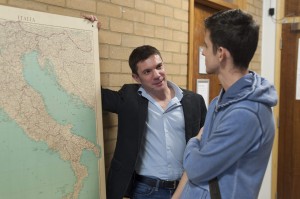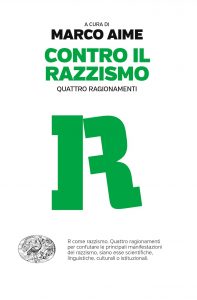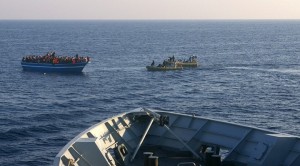 When modern languages are in the news, Reading Reacts. In a regular feature, we’ll invite members of the Reading community to comment on current events, sharing their insights about what is happening in the world beyond the university. This week, we’ve asked Professor Catherine Leglu to respond to an article in the Sunday Times of 27 July 2014, ‘GCSE enough to take degree in languages’. Here are Professor Leglu’s reflections on the important subject of who can and should study languages at university.
When modern languages are in the news, Reading Reacts. In a regular feature, we’ll invite members of the Reading community to comment on current events, sharing their insights about what is happening in the world beyond the university. This week, we’ve asked Professor Catherine Leglu to respond to an article in the Sunday Times of 27 July 2014, ‘GCSE enough to take degree in languages’. Here are Professor Leglu’s reflections on the important subject of who can and should study languages at university.
We are delighted that the University of Reading was approached to give its views about the well-publicised fall in applications to post-A Level degree courses in Modern Languages in the UK. However, a number of substantive points were made in this article that do not correlate with the situation here in Reading, or indeed, we believe, in the rest of the HE institutions that offer ab initio languages to degree level. An ab initio language degree involves learning the language from scratch, at beginners’ level, but going on to complete the degree at the same level of knowledge and fluency as students who might have a GCSE or A-Level in that language when they began their degree programme.
First and most important is the fact that introducing ab initio degree programmes is not new. Many languages are taught from beginners’ level in many UK universities. Arabic, Russian and Chinese are normally acquired without a requisite prior qualification in the language, and these graduates remember spending their first term learning a new script. It is equally normal to study Latin and Ancient Greek from scratch after the age of 18, or in the case of postgraduate students, from any age beyond 21. What is new is the expansion of degree programmes in the major European languages (Spanish, German, French) to include ab initio degree programmes.
Many undergraduates in these languages have learned others from scratch during their studies, such as Portuguese, Catalan or Dutch. Reading has long had an ab initio degree in Italian, because Italian is very rarely taught in state sector secondary schools, as indeed is Russian. Also, there is nothing inherently strange about acquiring a new language at university, as many undergraduates enrich their studies by learning a language as a minor part of their BA degree. It is therefore difficult to accept that there could be a risk in taking a language without having an A level in it.
Our departmental language co-ordinator, Enza Siciliano Verruccio, was approached by the authors of the Sunday Times article, but the  information she gave did not appear in the published version. She carried out a survey of ab initio language teaching in UK universitiesin 2010-11, and it is available online. Its main conclusions for 2010-11, in England alone, are that ALL 46 languages available to study at degree level were offered ab initio (this is based on the 53 languages departments that then existed). 86% of the institutions that offered Spanish, offered it ab initio; of all the institutions that offered German, 55% of them did so at ab initio level; whereas French was offered ab initio only in 36% of all the Higher Education Institutions (HEIs) that offered it.
information she gave did not appear in the published version. She carried out a survey of ab initio language teaching in UK universitiesin 2010-11, and it is available online. Its main conclusions for 2010-11, in England alone, are that ALL 46 languages available to study at degree level were offered ab initio (this is based on the 53 languages departments that then existed). 86% of the institutions that offered Spanish, offered it ab initio; of all the institutions that offered German, 55% of them did so at ab initio level; whereas French was offered ab initio only in 36% of all the Higher Education Institutions (HEIs) that offered it.
An ‘upsurge in ab initio [teaching] offer’ was already documented in 2003, before the major changes to the National Curriculum took effect (M. Kelly and D. Jones, A New Landscape for Languages, London, Nuffield Foundation (2003: 24)). Analysing the data regarding the entry requirements for the top nine languages taught ab initio at degree level in HEIs in England – that is, Spanish, Italian, German, Mandarin, French, Russian, Arabic, Japanese, and Portuguese – it emerges that:
“An A level in another foreign language remains the most sought after qualification, followed more or less closely by a GCSE in another language. For the majority of the ab initio languages above, around a quarter of the institutions that offer them have degree programmes open to students who have never studied a foreign language before entering university. For Spanish this figure rises to almost a third of the institutions where it is offered ab initio, and it is close to half of the institutions for Chinese and Japanese.”
In conclusion, ab initio language degree programmes are not at all new, and not at all limited. And as for the entry requirements, offering a language degree to students who may have never have studied languages before is not such an isolated ‘deviation’.
One of the most intriguing claims made in this article is that universities are reduced to accepting students who happen to speak a given foreign language at home. Heritage and a love of a culture are well-established as a pathway into language study. In fact, Reading’s French degree programme has a first-year ‘intermediate language’ course that caters specifically for, respectively, students with GCSE French, and students who have grown up speaking French at home but have no advanced formal teaching provided by their secondary school.
We know that the market is there. It is not an admission of defeat, far from it, to make sure that we can respond to that market.
What is the market context in 2014, exactly? The recent weak provision of languages beyond the age of 14 in English secondary  schools, largely the product of changes to the National Curriculum, should not be a barrier to students feeling able to rekindle their interest in a language and culture once they start the UCAS application process. One of us spent a happy hour at a recent open day with two enthusiastic applicants who had no formal training in French, but an immense interest in learning it. There is a real thirst for language acquisition and too many schools cannot provide for it for the moment. Universities can, and in fact have long done so. The fact that fewer students are taking A Levels in MFL means that universities need to respond in an imaginative and creative way to the profile of our future undergraduates. The most obvious approach is to open more of our courses to students with GCSEs in a language.
schools, largely the product of changes to the National Curriculum, should not be a barrier to students feeling able to rekindle their interest in a language and culture once they start the UCAS application process. One of us spent a happy hour at a recent open day with two enthusiastic applicants who had no formal training in French, but an immense interest in learning it. There is a real thirst for language acquisition and too many schools cannot provide for it for the moment. Universities can, and in fact have long done so. The fact that fewer students are taking A Levels in MFL means that universities need to respond in an imaginative and creative way to the profile of our future undergraduates. The most obvious approach is to open more of our courses to students with GCSEs in a language.
A GCSE in a language, any language, is the equivalent of that C or above in GCSE Maths. It is valuable, technical training, and it demonstrates the ability to learn and to exploit complex codes in writing, speech and gesture (yes, gesture, as well as facial expression and posture). It is a very solid foundation for a degree programme as long as the first year at university is appropriately designed to bring the student up to post-A Level standard – This is feasible. One of us took Spanish GCSE and A Level over two years.
There has been talk for the past six years of a ‘lost generation’ of language graduates in the UK. Employers are keen to recruit graduates who possess the skills to acquire linguistic and cultural knowledge quickly, to respond with sensitivity and knowledge in a culture that is not their own, and to meet the rest of the world with minds that are both open and informed. Furthermore, in this globalized world of business, many professional adults are expected to learn languages quickly when they are sent overseas on placements. Inter-cultural experience boils down to having both linguistic and cultural knowledge; graduates in Modern Languages have that as one of their key skills, and it seems essential to extend the opportunity to post-GCSE applicants.
A final thought: if an A Level in the subject is an essential qualification for a degree programme, then departments of Archaeology, Cybernetics and Anthropology would have to close down. More  seriously, there is nothing inherently magical about learning a new language; if there were, then computer coding would be beyond most of us, yet we are told that all children should learn it. The myths circulating concerning language acquisition are often based on limited empirical evidence, such as the impossibility of learning a language if one is dyslexic (we have known dyslexic students achieve 2.1 degrees in ab initio Russian), or the impossibility of learning more than one language at high level (many countries in the world have bilingual and trilingual communities). Ab initio degree programmes in languages are long-established and offer a creative solution to the current problem in recruiting students to Languages degrees, a problem that is not of the universities’ own making.
seriously, there is nothing inherently magical about learning a new language; if there were, then computer coding would be beyond most of us, yet we are told that all children should learn it. The myths circulating concerning language acquisition are often based on limited empirical evidence, such as the impossibility of learning a language if one is dyslexic (we have known dyslexic students achieve 2.1 degrees in ab initio Russian), or the impossibility of learning more than one language at high level (many countries in the world have bilingual and trilingual communities). Ab initio degree programmes in languages are long-established and offer a creative solution to the current problem in recruiting students to Languages degrees, a problem that is not of the universities’ own making.
If you would like to learn more about studying languages at the University of Reading, including studying a language you may not have studied in school, we invite you to visit our website. For up-to-date information about the Department of Modern Languages and European Studies, we also encourage you to follow our blog. And watch this space for reflections from some of our students, past and present, who have pursued ab initio degrees.




















 When modern languages are in the news,
When modern languages are in the news,  information she gave did not appear in the published version. She carried out a survey of ab initio language teaching in UK universitiesin 2010-11, and
information she gave did not appear in the published version. She carried out a survey of ab initio language teaching in UK universitiesin 2010-11, and  schools, largely the product of changes to the National Curriculum, should not be a barrier to students feeling able to rekindle their interest in a language and culture once they start the UCAS application process. One of us spent a happy hour at a recent open day with two enthusiastic applicants who had no formal training in French, but an immense interest in learning it. There is a real thirst for language acquisition and too many schools cannot provide for it for the moment. Universities can, and in fact have long done so. The fact that fewer students are taking A Levels in MFL means that universities need to respond in an imaginative and creative way to the profile of our future undergraduates. The most obvious approach is to open more of our courses to students with GCSEs in a language.
schools, largely the product of changes to the National Curriculum, should not be a barrier to students feeling able to rekindle their interest in a language and culture once they start the UCAS application process. One of us spent a happy hour at a recent open day with two enthusiastic applicants who had no formal training in French, but an immense interest in learning it. There is a real thirst for language acquisition and too many schools cannot provide for it for the moment. Universities can, and in fact have long done so. The fact that fewer students are taking A Levels in MFL means that universities need to respond in an imaginative and creative way to the profile of our future undergraduates. The most obvious approach is to open more of our courses to students with GCSEs in a language. seriously, there is nothing inherently magical about learning a new language; if there were, then computer coding would be beyond most of us, yet we are told that all children should learn it. The myths circulating concerning language acquisition are often based on limited empirical evidence, such as the impossibility of learning a language if one is dyslexic (we have known dyslexic students achieve 2.1 degrees in ab initio Russian), or the impossibility of learning more than one language at high level (many countries in the world have bilingual and trilingual communities). Ab initio degree programmes in languages are long-established and offer a creative solution to the current problem in recruiting students to Languages degrees, a problem that is not of the universities’ own making.
seriously, there is nothing inherently magical about learning a new language; if there were, then computer coding would be beyond most of us, yet we are told that all children should learn it. The myths circulating concerning language acquisition are often based on limited empirical evidence, such as the impossibility of learning a language if one is dyslexic (we have known dyslexic students achieve 2.1 degrees in ab initio Russian), or the impossibility of learning more than one language at high level (many countries in the world have bilingual and trilingual communities). Ab initio degree programmes in languages are long-established and offer a creative solution to the current problem in recruiting students to Languages degrees, a problem that is not of the universities’ own making. on news and current events, sharing their insights about what is happening in the world beyond the university. To inaugurate the Reading Reacts series, we’ve invited
on news and current events, sharing their insights about what is happening in the world beyond the university. To inaugurate the Reading Reacts series, we’ve invited  government’s decision to make languages optional after 14, a change that was introduced in September 2004. The numbers speak for themselves. In 2011, there were 154,000 entries for GCSE French, just over half the number there were in 2004, when 300,000 sat the examinations. The impact of that Government decision is still felt today despite the work done by
government’s decision to make languages optional after 14, a change that was introduced in September 2004. The numbers speak for themselves. In 2011, there were 154,000 entries for GCSE French, just over half the number there were in 2004, when 300,000 sat the examinations. The impact of that Government decision is still felt today despite the work done by  Universities. To this end, and in response to the 2009 report
Universities. To this end, and in response to the 2009 report  makers alike to acknowledge their responsibility and to become engaged game-changers. To put it simply, this means realising the strategic advantage afforded by Britain’s multicultural make-up and transforming it into a cultural and economic resource for the nation. For too long the export of Global English has obscured the fact that Britain is in fact a multilingual nation.
makers alike to acknowledge their responsibility and to become engaged game-changers. To put it simply, this means realising the strategic advantage afforded by Britain’s multicultural make-up and transforming it into a cultural and economic resource for the nation. For too long the export of Global English has obscured the fact that Britain is in fact a multilingual nation. most vocal ambassadors in demonstrating the value of language study. Our
most vocal ambassadors in demonstrating the value of language study. Our